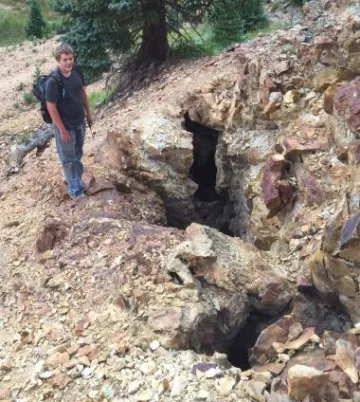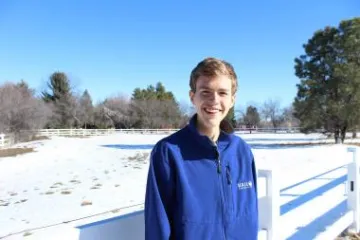By Caelen Burand, Student Research Coordinator, Lowell Institute for Mineral Resources, and 3rd year Geology and Mining Engineering Major, October 2021
I approached the Lowell Institute for Mineral Resources before the first midterm of my freshmen year, looking for research. At the time, they didn’t have a research program for undergraduate students. Two years later, when they asked if I would be interested to help design an interdisciplinary research hub for students in the new School of Mining and Mineral Resources, I was thrilled!

A younger Caelen Burand, rockhounding
I have always been interested in mining, minerals, and research. I gained an intuition for geology early on, as my childhood was dedicated to exploring historic Coloradan mining districts. I spent the majority of my free moments searching for evidence of hydrothermal alteration, sulfidation, structures, and more. I would note interesting observations, map my data, infer mineral trends, and hypothesize on the mechanisms at their root. I would check my hypotheses, re-evaluate, and without the explicit intent, I grew into a young mineral resources researcher.
During this time, I also became keenly aware of the potential social, economic, and environmental impacts of mining as it was obvious that many of these 19th and early 20th century mines were an environmental hazard and social burden with the clear need for improvement. It inspired my choice to study mining engineering along with geology as I saw it as the opportunity to maximize the benefits of our mineral resources and avoid the mistakes of the past.
Entering the University of Arizona, I was astounded by the plethora of resources available and interconnectedness among the various fields. Yet mining seemed to be treated as rather remote and distant from the other subjects. This represents a missed opportunity and I am excited to be a part of the team working to change this.
Developing solutions to the multi-dimensional challenges facing mineral resources requires a workforce of ambitious problem-solvers. The student research hub will help cultivate the invaluable skills, mindset, and attitudes to solve these daunting challenges.
The mining industry’s complex history has proven it’s potential to either drive widespread prosperity while providing critical resources or produce significant harm. To ensure prosperity, the extraction of mineral resources needs to engage with diverse, well-rounded, individuals from a variety of disciplines. Unfortunately, in the status quo, our industry is out of the sights and minds of brilliant students, innovators, and researchers that could revolutionize mineral resourcing. Particularly, because it is an industry characterized by remote locales, niche laws and regulations, and a poor social image, it is difficult for undergraduate or graduate students at the university to conduct or become involved in meaningful mining and mineral resources research. The development of this novel student research hub is an answer to this need for greater transdisciplinary mining and minerals research.
Where we’re headed

This research hub is envisioned as an “all-call” for those who want to make their mark, innovate, and explore the uncharted. Mining and mineral resources is a dynamic field undergoing immense change. Our research hub will create common ground for students and researchers alike. We envision, among several programs, sourcing real-world challenges that multidisciplinary teams can solve in the forms of contests, work experiences, and projects. Incentivized by the pure challenge, publicity, and prizes, teams composed of students, researchers, faculty, and others from across the globe are welcomed! We want to connect our world without borders or affiliations creating barriers. The innovation will not end at these events. Research will be cultivated into pilot projects and production through seed funding, mentoring, and other grant opportunities provided by The School of Mining and Mineral Resources. Finally, to springboard ideas into the public sphere, research showcases are a key feature to the hub. These showcases, at significant events or hosted at UArizona will be the platform students need to have their ideas recognized by a wider audience.
Developing the roadmap: researching our route
Sound ambitious? We have some exciting ideas. But there’s a method to the madness. I am currently creating a complete landscape of noteworthy undergraduate research programs, at UArizona, other universities, and organizations, to understand what’s currently being done, best practices, potential support networks, and identify partners.
Here’s some interesting things I’ve found so far:
It should not come as a surprise that the University of Arizona ranks high among research institutions globally and includes many great student research programs. Among these is the Design Build program offered by the College of Architecture, Planning, and Landscape Architecture. This program enables our students to work with the Tucson community to research, design, and build creative, but also functional architectural masterpieces. It has been able to help engage students in the challenge of creating and executing an experimental design with the outcome of teaching them critical thinking, perseverance, and teamwork.
Outside our university, I have found inspiration in programs like MIT’s Office of Experimental Learning which sits at the head of several powerful student research programs responsible for facilitating hyperloop pilots, innovations in global public health, and provides resources for multiple labs dedicated to student experiments.
Innovative research is not only in academia and there has been a surge of organizations pioneering breakthroughs. An example of which is Conservation X Labs, who have championed innovation challenges that create user-friendly solutions for conserving our environment, biodiversity, and planet’s finite natural resources. Among other accolades, this group was recently named in Fast Company’s most innovative companies for their work retrofitting equipment to collect poaching data analyzed by AI for the improved protection of endangered species!
These are only a few of the exciting research initiatives that are occurring throughout the globe and I will continue to seek out the best ideas for our own student research hub!
After completing a thorough review of our opportunities, I will incorporate my landscape observations into a design for a practical student research programs for the School of Mining and Mineral Resources, some of which we hope to pilot as early as Spring 2022. The research hub itself is an experiment, so measurement, evaluation and continuous improvement must all factor into our long term plans for maintenance, expansion and development.
Mining a Sustainable Future
Today, as a mining engineering and geology student at the University of Arizona Honors College, founder and director of Young Mining Professionals Arizona, and a lead researcher for Mercury Free Mining I am excited to apply these learning experiences to contribute to this novel transdisciplinary student research hub. With our ambitious aims, I am confident we will improve our industry’s ability to connect students to real issues and incentivize research that will push the boundaries of science, engineering, the humanities, and much more. Ultimately, improving our world.
Lastly, if you’d like to know more, or have ideas or examples to share, please do not hesitate to reach out. I am available on LinkedIn or by email at caeburand@email.arizona.edu.

